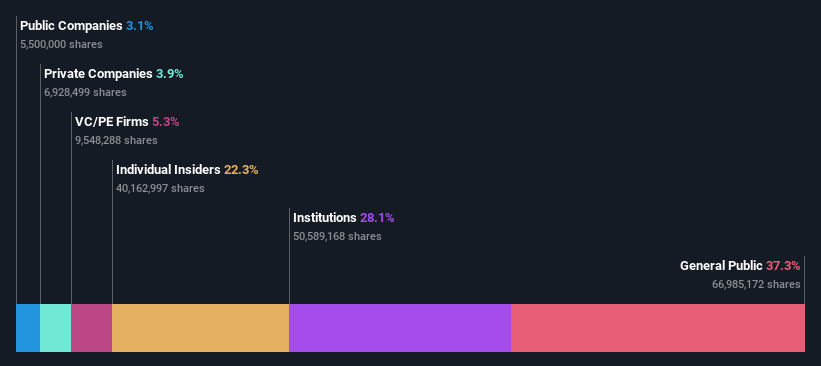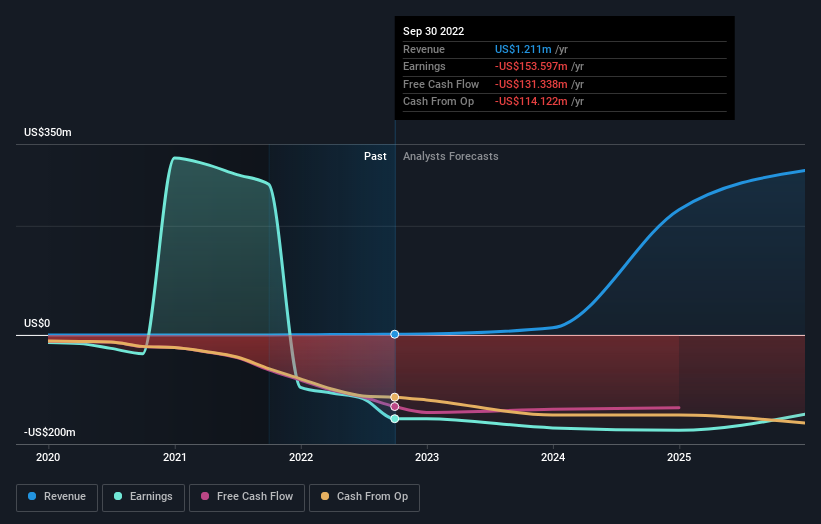- United States
- /
- Machinery
- /
- NYSEAM:HYLN
Hyliion Holdings Corp. (NYSE:HYLN) surges 11%; individual investors who own 37% shares profited along with institutions

Every investor in Hyliion Holdings Corp. (NYSE:HYLN) should be aware of the most powerful shareholder groups. And the group that holds the biggest piece of the pie are individual investors with 37% ownership. That is, the group stands to benefit the most if the stock rises (or lose the most if there is a downturn).
Following a 11% increase in the stock price last week, individual investors profited the most, but institutions who own 28% stock also stood to gain from the increase.
In the chart below, we zoom in on the different ownership groups of Hyliion Holdings.
Check out our latest analysis for Hyliion Holdings

What Does The Institutional Ownership Tell Us About Hyliion Holdings?
Institutions typically measure themselves against a benchmark when reporting to their own investors, so they often become more enthusiastic about a stock once it's included in a major index. We would expect most companies to have some institutions on the register, especially if they are growing.
We can see that Hyliion Holdings does have institutional investors; and they hold a good portion of the company's stock. This suggests some credibility amongst professional investors. But we can't rely on that fact alone since institutions make bad investments sometimes, just like everyone does. When multiple institutions own a stock, there's always a risk that they are in a 'crowded trade'. When such a trade goes wrong, multiple parties may compete to sell stock fast. This risk is higher in a company without a history of growth. You can see Hyliion Holdings' historic earnings and revenue below, but keep in mind there's always more to the story.

Hedge funds don't have many shares in Hyliion Holdings. The company's CEO Thomas Healy is the largest shareholder with 18% of shares outstanding. The Vanguard Group, Inc. is the second largest shareholder owning 6.2% of common stock, and BlackRock, Inc. holds about 5.6% of the company stock.
On further inspection, we found that more than half the company's shares are owned by the top 10 shareholders, suggesting that the interests of the larger shareholders are balanced out to an extent by the smaller ones.
Researching institutional ownership is a good way to gauge and filter a stock's expected performance. The same can be achieved by studying analyst sentiments. There are plenty of analysts covering the stock, so it might be worth seeing what they are forecasting, too.
Insider Ownership Of Hyliion Holdings
While the precise definition of an insider can be subjective, almost everyone considers board members to be insiders. Management ultimately answers to the board. However, it is not uncommon for managers to be executive board members, especially if they are a founder or the CEO.
I generally consider insider ownership to be a good thing. However, on some occasions it makes it more difficult for other shareholders to hold the board accountable for decisions.
It seems insiders own a significant proportion of Hyliion Holdings Corp.. Insiders have a US$141m stake in this US$629m business. It is great to see insiders so invested in the business. It might be worth checking if those insiders have been buying recently.
General Public Ownership
The general public-- including retail investors -- own 37% stake in the company, and hence can't easily be ignored. While this size of ownership may not be enough to sway a policy decision in their favour, they can still make a collective impact on company policies.
Private Equity Ownership
Private equity firms hold a 5.3% stake in Hyliion Holdings. This suggests they can be influential in key policy decisions. Some might like this, because private equity are sometimes activists who hold management accountable. But other times, private equity is selling out, having taking the company public.
Private Company Ownership
Our data indicates that Private Companies hold 3.9%, of the company's shares. It might be worth looking deeper into this. If related parties, such as insiders, have an interest in one of these private companies, that should be disclosed in the annual report. Private companies may also have a strategic interest in the company.
Public Company Ownership
We can see that public companies hold 3.1% of the Hyliion Holdings shares on issue. This may be a strategic interest and the two companies may have related business interests. It could be that they have de-merged. This holding is probably worth investigating further.
Next Steps:
I find it very interesting to look at who exactly owns a company. But to truly gain insight, we need to consider other information, too. Case in point: We've spotted 3 warning signs for Hyliion Holdings you should be aware of, and 1 of them shouldn't be ignored.
If you are like me, you may want to think about whether this company will grow or shrink. Luckily, you can check this free report showing analyst forecasts for its future.
NB: Figures in this article are calculated using data from the last twelve months, which refer to the 12-month period ending on the last date of the month the financial statement is dated. This may not be consistent with full year annual report figures.
Valuation is complex, but we're here to simplify it.
Discover if Hyliion Holdings might be undervalued or overvalued with our detailed analysis, featuring fair value estimates, potential risks, dividends, insider trades, and its financial condition.
Access Free AnalysisHave feedback on this article? Concerned about the content? Get in touch with us directly. Alternatively, email editorial-team (at) simplywallst.com.
This article by Simply Wall St is general in nature. We provide commentary based on historical data and analyst forecasts only using an unbiased methodology and our articles are not intended to be financial advice. It does not constitute a recommendation to buy or sell any stock, and does not take account of your objectives, or your financial situation. We aim to bring you long-term focused analysis driven by fundamental data. Note that our analysis may not factor in the latest price-sensitive company announcements or qualitative material. Simply Wall St has no position in any stocks mentioned.
About NYSEAM:HYLN
Hyliion Holdings
Provides sustainable electricity-producing technology that offers solutions for clean, flexible, and efficient electricity production.
Excellent balance sheet moderate.


